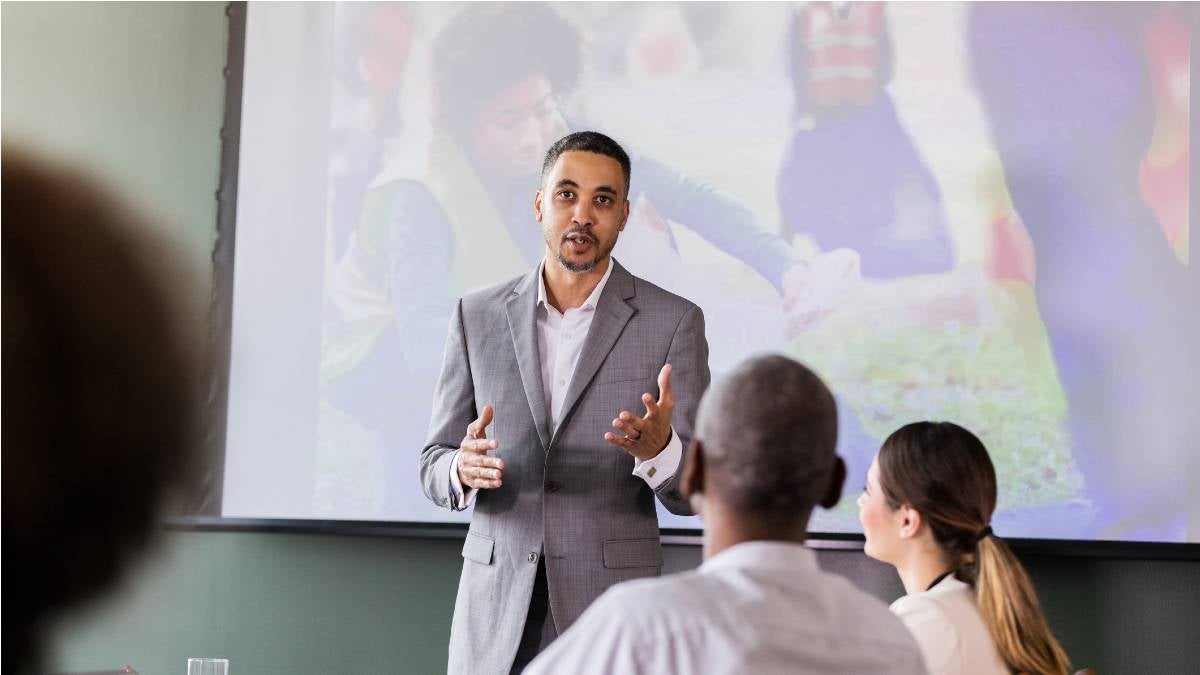The benefits of corporate giving
Corporate giving does not just benefit charities; it enables companies to showcase their commitment to social responsibility and attract new talent

The current economic conditions, dominated by market volatility and the cost-of-living crisis, have caused the non-profit sector to struggle even while many companies continue to perform strongly.
Although the cumulative revenues of FTSE 100 companies increased by 12% between 2016 and 2022, total charitable donations have remained unchanged since 2016, according to the Charities Aid Foundation (CAF).
The organisation has since urged more businesses across all sectors to partake in corporate giving to demonstrate a clear commitment to social responsibility. It also says that businesses should engage their employees in community initiatives to enhance their effectiveness and foster a sense of social responsibility within their workforce. To achieve this, companies should set clear ESG commitments that include the ambitions of the whole team from the beginning, according to Rose Hayes, director of Cartwright Communications.
“Taking team passions and interests into account when choosing ESG commitments helps create immediate interest, while forming an employee ESG committee takes this further into the delivery of pledges,” she says.
She adds this approach has proven successful because many firms’ employees are similarly passionate about the charities chosen by the business. For example, they may decide to donate the money they would usually spend on personal Christmas cards.
Businesses can engage in corporate giving in many forms, including voluntary cash and in-kind donations as well as matching employee contributions and facilitating employee volunteering. The benefits of corporate giving stretch beyond solely funding charities, as it spreads awareness of the company’s commitment to the cause and among other corporations, says Hayes. “It is another way of communicating our social value work and commitment to existing and potential clients, as these credentials are continuing to grow in importance,” she says.
Nikki Barraclough, chief executive director of Prevent Breast Cancer, says the most beneficial aspect of corporate giving for charities is the relationships that are built with businesses. “Income is absolutely critical, but the success of the relationship is really down to having an ambassador or champion within that business,” she says.
Creating strong relationships with multiple individuals in a business ensures that if someone leaves the relationship will continue, while this also expands the charity’s database of supporters, she says. Barraclough adds that corporate giving also benefits companies because it meets the workforce’s expectations for corporate responsibility and acts as a tool to attract new employees.
“When potential employees are looking at which companies they want to join, they consider what they are doing to support charities and their local community,” she says.
This perspective is supported by the Charities Aid Foundation’s research with YouGov, which reported 69% of the public believe businesses have an obligation to support the local communities in which they operate. The survey also revealed nearly half (47%) of people would be more inclined to work for a business if it donates to charitable causes.
Involvement in corporate giving also enables businesses to showcase their commitment to strategic business goals, such as social responsibility and ESG objectives. This is important as employees and stakeholders are increasingly seeking a tangible demonstration of the actions that companies are taking to align with sustainability goals, according to Barraclough. “Make sure that ESG and corporate social responsibility is not just a tick box, make it part of your values and be transparent,” she says.
Philippa Cornish, head of corporate clients at CAF, recommends businesses commit to ambitious and bold strategic giving programmes that meet stakeholder expectations and reflect the business’s core purpose.
“This ensures buy-in across an organisation, demonstrates genuine commitment to internal and external audiences, and ensures corporate charitable donations are not dismissed as disingenuous box-ticking,” she says.
By committing to a strategic programme of corporate giving, companies can make a positive impact on their communities, and on their reputations, and crucially, affect real change.
Corporate giving: how your business could be the key to charity survival
CAF's analysis of the FTSE 100 financial reports for the year ending in 2022 show that £1.85bn was committed to communities and charity – the same as when the report was last published (2016). This effectively means a 17% cut in funding. Corporate giving would have needed to rise to £2.24 billion in 2022 to achieve the same spending power
Turning the tide in corporate giving
Corporate giving should be documented in annual reports, creating a culture of giving and encouraging transparency around charity engagement strategies

In the UK, more than two-thirds (69%) of the public believe that businesses have an obligation to support the local communities in which they operate, according to a YouGov poll carried out by the Charities Aid Foundation (CAF) in December 2022.
And in research from May 2023, almost half (47%) of respondents said they would be more inclined to work for a business that donates to charitable causes, while 56% said they would be more likely to buy a product or services from such an organisation.
This highlights both the moral impetus for businesses to commit to charitable giving and the strong commercial case behind doing so. But all indications point to companies giving less to charities and cutting aid across the board.
CAF’s analysis of annual reports of the FTSE 100 constituents for the financial year ending in 2022, together with survey returns from the companies themselves, show that total donations by these companies have remained unchanged since 2016 at £1.85bn, despite rising inflation.
In real terms, giving by the FTSE 100 has declined by 17% since 2016, with the average sum donated as a percentage of pre-tax profits falling from 2.4% to 0.8%. While there was a temporary spike in donations during Covid-19, the overall value of corporate giving has dropped by 26% in the past decade.
The impact on charities is substantial, reports Neil Heslop OBE, chief executive of CAF, pointing to the Foundation’s Charity Resilience Index; in September, 41% of charities said they could not help anyone else and 12% were turning people away.
In the midst of a cost-of-living crisis, “the relentless financial pressure is continuing,” says Heslop. “Many charities are unsure how they will survive from month to month. Tens of thousands are at full capacity, and sadly this means many are having to turn people away.”
Falling donations
The steady decline in corporate giving is down to more than economic pressures. Despite market turbulence, FTSE 100 pre-tax profits rose 25% between 2016 and 2022 to a median sum of £611m. The combined 2022 pre-tax profits of Shell, Glencore and Rio Tinto alone exceed the total for the full FTSE 100 in 2016.
“There’s definitely more that can be done,” says Philippa Cornish, CAF’s head of corporate clients. “The way FTSE 100 companies operate sets the tone for the rest of business.”
But she acknowledges that CAF’s research was conducted “coming out of the pandemic. Many organisations had to abandon longer-term strategies to rechannel funding. We’re just starting to see people reset and think, ‘What do the next three years look like in terms of our responsible business side?’”
Now, teams may have a broader remit due to the increased pressure on diversity and inclusion, and environmental issues. “What we’d say is that underpinning your strategy across all these areas with a grant or donation sends out a clear message of the importance of that strategy to the business,” says Cornish.
A notable positive is that corporate giving is becoming more widespread – with the top 10 corporate donors accounting for the smallest ever proportion of the overall sum. There has also been an increase (from six to 10) in the number of companies continuing to donate while making pre-tax losses, when comparing 2016 and 2022 annual reports.
However, the number of companies donating at least 1% of their profits is down; 41 companies gave less than 0.5% of their pre-tax profits in 2022 compared to 37 in 2016.
And despite windfalls in the energy sector, it is the healthcare industry that is disproportionately generous – accounting for just five of the FTSE 100 companies but providing almost a quarter (22%) of total corporate giving; the nature of the sector means that a significant proportion of this is ‘in kind’ rather than in monetary donations.
Aligning business strategy with social purpose
Going forward, CAF urges all FTSE 100 companies to commit to donating at least 1% of their pre-tax profits.
This gives organisations a defined focus, and guards against the swings in inflation and profitability, says Cornish, while substantially boosting overall donations. “Had all FTSE companies donated 1% in the last financial year, charities would have received £3.13bn in additional funding,” she says.
To get the best out of giving, organisations should align their social purpose with their business strategy, establishing a culture of giving which engages staff and includes role-modelling from leaders. This can be encouraged by linking key performance indicators and executive pay to progress on responsible business targets.
Personal tales of giving should also be celebrated. “During Covid-19, we saw top executives give away a lot of their salary or bonuses as an encouragement to the rest of the organisation,” says Cornish. “It’s about hardwiring responsibility for giving into an organisation from the top down.”
In practical terms, she explains that alignment strategies involve “focusing on a cause that is relevant to your business and means something to your people. For example, one client – a law firm – has a programme around global access to justice, while a property firm is increasing diversity through employability initiatives.”
Ideally, a proportion of giving would be programmatic and long term – enabling charities to plan too – with an element of flexibility that allows for reactive donations.
The power of storytelling
Many excellent examples of corporate giving already exist; Cornish references industrial technology company Smiths Group as a FTSE 100 company on a journey to make a greater impact with its charitable spend. Through establishing the Smiths Group Foundation, with an initial planned endowment of £10m, it aims to improve access to high-quality education and to build skills in stem subjects for underrepresented groups.
However, a general lack of transparency around giving and a dearth of proactive storytelling undermines public awareness of the efforts FTSE businesses are making.
Though the cohort of companies with discernible charitable data is up from 85 in 2016 to 94 in 2022, there remains a lack of consistency, with CAF calling on policymakers to set clear standards and make the reporting of corporate giving mandatory within company annual reports.
Meanwhile, Cornish encourages organisations to blow their own trumpets – telling clear and authentic stories about the work they are doing. Currently, the public believes that only 37% of the FTSE 100 donate to charity, when in fact 94% of the FTSE publicly declare charitable giving.
“Before you communicate your story externally, it’s vital that it’s believed internally,” she says. “Focusing on the outcome beyond the input is important; telling the story of what their money has enabled. When businesses have symbiotic relationships with the charities they work with, that’s when we see it going really well.”
In such scenarios, where FTSE organisations give strategically and thoughtfully, they can make a positive difference to society. Simultaneously, they will be engaging their staff, attracting customers and setting a positive example to the wider business community.
Becoming more strategic about charity engagement
Businesses should align their social purpose with their corporate strategy to achieve more meaningful charity relationships

There’s no doubt that corporate giving generates shared value for society and business, supporting charities, while providing organisations with a proven competitive advantage.
In a modern workplace where a strong sense of purpose fuels employee engagement, giving back to communities on a local or national scale can foster loyalty and unleash motivation – as well as attracting and retaining customers.
While all donations are valuable, the most effective giving involves organisations moving beyond ad-hoc donations to become more strategic and impact-focused about how they give. Programmes excel when companies align their social purpose to their business strategy, and design sustainable programmes that incorporate long-term funding with the agility to respond to unexpected crises.
Even where substantial monetary donations are not feasible, there are still ways in which organisations can begin to establish a culture of giving; for example, by setting up a payroll giving scheme for employees, through which people can give to charity tax-free through PAYE.
For those with scope to do more, there are creative ways in which organisations can achieve impactful giving, according to their size, budget and overall intentions, with support from professional partners.
TSG: Achieving continuity of giving through a corporate foundation
To adopt a more strategic and considered approach to corporate giving, Technology Services Group (TSG), a nationwide IT services and consultancy firm, has established a corporate foundation, committing 2% of its annual pre-tax profits to charity.
Foundations provide a structure through which companies can address social and environmental issues relevant to their workforce and commit to contributing over the long term. They provide a clear focus and ring-fenced budgets, offering continuity of giving.
TSG’s intention, alongside its journey towards net-zero carbon emissions, is to equip people across the UK to unlock digital opportunities; its foundation supports projects that lead to greater digital awareness, improved digital skills and confidence and safe access to the digital world.
These aims align with its business strategy as an IT firm and are designed to resonate with its people; corporate foundations thrive when stakeholders are engaged with their activities.
The company’s commitment followed feedback from staff, who were keen to help bring the strategy to life. Under the scheme, employees can nominate charities that contribute to any one of these objectives to receive grants from the fund.
Establishing a foundation involved working closely with the Charities Aid Foundation (CAF) to identify an impact statement, design an impact framework and develop the products to deliver it. A workshop with representatives from across the business helped to gather insights and ensure inclusivity.
To avoid having to register a separate entity through the Charity Commission, TSG – being an SME with a relatively modest budget and a need to ensure staff could support grassroots causes without too much process – opened an account with CAF to protect and distribute its charitable funds, through which it could set up its foundation.
Outsourcing fundholding in this way is a more cost-effective solution that gives TSG flexibility as well as “an element of control and compliance,” says TSG’s executive chairman David Stonehouse. “For the amount of money, it wasn’t worth setting up [our own charity]; we’d be spending most of our budget on the administration.”
TSG’s foundation will enable the company to increase giving in line with its own growth and analysis of the charitable outcomes achieved. It also provides concrete evidence of TSG’s corporate purpose and commitment to improving society. “Our customers and prospects are increasingly asking us what we’re giving back to society,” says Stonehouse.
Spirax-Sarco Engineering: Connecting business strategy and corporate giving
Spirax-Sarco Engineering, which specialises in steam solutions, electric thermal energy management, pumping and fluid path technologies, pledges to create sustainable value for all its stakeholders through its ‘One Planet Sustainability Strategy.’ As part of this, the company is donating up to £15m by 2030 to promote inclusive and equitable access to education in the communities in which it operates.
Through its Group Education Fund, nearly 150 operating companies that make up Spirax-Sarco Engineering can identify and apply for grants to help address local education needs in the communities they serve.
Specific intentions are to improve diversity in engineering, access to education, quality of education, and female access to education. Honing these objectives involved working with CAF to identify the barriers to education in some of Spirax-Sarco Engineering’s countries of operation, specifically China, France, India, Mexico, South Africa, South Korea, the UK and the US.
Regional workshops gathered insights from stakeholders around the world and an impact framework was co-created with CAF. “We have such a broad set of aims with the education fund that I wasn’t sure that it was going to be possible to create an impact framework,” says Sarah Peers, group director of sustainability at Spirax-Sarco Engineering. “But I haven’t found a single grant to date that doesn’t have at least one output and one outcome metric that works, so it genuinely is working.”
In 2022, the first year of the initiative, more than £1m was shared between 51 projects, including a new community school in Egypt and a TECWomen project in Cornwall to inspire more girls and women to embark on careers in technology and engineering.
BNP Paribas UK: Working in partnership to achieve more
Tapping into the United Nation’s Sustainable Development Goals (UN SDGs) around reducing inequality and poverty and improving financial futures, BNP Paribas UK is working to make a positive contribution to society. But it didn’t want that impact to be disjointed or surface-level, rather it designed a strategy to ensure a targeted approach to increase its impact on social issues across the UK.
Part of achieving this saw it work with CAF to tap into the organisation’s expertise around developing a corporate giving strategy and establishing a ‘Give As You Earn’ programme for employees. Through this process, CAF identified that addressing social mobility through education could meet the bank’s objective of linking its charitable efforts to the UN SDGs while also improving the communities in which it operates.
CAF undertook an analysis of education and the challenges young people face in gaining employment. Using this insight, BNP Paribas UK has deployed a programme alongside the charity Teach First that will place teachers in partner schools in disadvantaged communities. Those teachers will deliver a curriculum around net zero and sustainability objectives, action points and sustainable finance.
Not only is this programme now closing the ‘attainment gap,’ by arming young people with relevant knowledge and skills for the modern workplace, but it set the standard for BNP Paribas UK’s charitable work. Building programmes in partnership with knowledgeable organisations, and tying its own objectives to key societal issues in its local communities will enable the business to deliver a greater impact on behalf of its audiences.
How charitable collaboration can overcome challenges
The development of strategic corporate partnerships provides charities with the necessary tools to fulfil their mission and ease the ever-growing list of pressures they face

As the demand for charitable services continues to rise, more charities are struggling to make a meaningful impact because of an increasing number of pressures. From financial constraints and the mission to secure funding to addressing pressing societal needs, charities are forced to navigate a complex landscape marked by a multitude of challenges.
However, businesses can play a vital role in relieving the burdens on charities and bolstering their long-term resilience by becoming invaluable allies.
The fight for funding
The relentless pursuit of funding has long been a challenge faced by charities, however this has been exacerbated over recent years due to the ongoing cost-of-living crisis. As a result, the CAF Charity Resilience Index reported only 30% of charities feel very confident in the security of their funding and 53% are worried about surviving in the current economic climate.
Honor Wilson-Fletcher MBE, CEO of British Exploring Society, says it is not just the pressure of securing funding that provides difficulties for charities, it is also the predictability of funding. She says multi-year funding packages are rare, so it is difficult to anticipate the timing of the next funding allocation and charities must be prepared to start each year without assured funding.
“There’s high levels of accountability for the money that you spend and low levels of risk tolerance among the people you get your money from, but you literally start from scratch every year,” she says.
Can businesses provide solutions?
The development of corporate partnerships allows businesses to play a crucial role in helping charities to overcome the challenges associated with funding. This collaborative approach between charities and businesses not only addresses immediate financial needs but also fosters sustained assistance for charitable organisations.
Many businesses offer charities financial aid through direct donations, grants, sponsorship or award a ‘charity of the year’ prize, which provides a one-off contribution to the non-profit. Even though donations can be very useful, businesses can also contribute their expertise to provide charities with the long-term support required to facilitate sustainable operations, says Claire Abbs, head of development and impact at Green Light Trust.
“Some corporates give services in kind and provide a payroll service or IT expertise. Rather than just donating money, they have all these skills and resources that they can share,” she says.
Lyndsay Wood, corporate fundraising manager for Essex and Herts Air Ambulance, adds that SMEs can also engage in regular giving by providing smaller and more manageable monthly donations. This acts as an alternative to the charity of the year relationships and long-term partnerships typically established with larger companies, she says.
“In working with companies of all shapes and sizes, our goal is to broaden our reach into different territories,” she says, “While the scale may differ, the essence remains centred around financial support, in a form that aligns with the capabilities and preferences of SMEs.”
Charities remain focused on seeking financial support, but for businesses without the immediate resources for financial aid, there is an alternative avenue for support, introducing the charity to their clients and partners, she adds.
“While financial support is paramount, we also understand the value of building relationships. This approach not only allows us to explore new opportunities but is crucial for diversifying income streams and fostering long-term support,” she says.
Developing effective partnerships
To create a successful corporate partnership, Wood says a two-way conversation between the charity and business is necessary to understand what each party seeks to achieve from the partnership. “Having those conversations and being open, transparent and clear on both sides makes for a really good strong base for a good partnership to develop,” she says. This shared communication can help to develop and suit everyone’s needs in circumstances where companies may choose to sponsor something specific and allows for the best impact, she says.
Woods adds it is also crucial to ensure that the relationship is mutually beneficial, which may be achievable through exposure and marketing opportunities for both the charity and business. For example, a Ford dealership, Gates Ford, has partnered with Essex and Herts Air Ambulance since 2019 to provide the charity with a dual-branded car for staff to use each year. “It enables our charity staff to move around Essex and Hertfordshire without using their own personal cars, but also promotes the partnership with Gates Ford as well as the work of Essex and Herts Air Ambulance,” she says.
Partnerships with charities can also allow businesses to achieve their ESG and responsible business goals, which strengthens the mutually beneficial relationship, adds Abbs. “We’re helping them [businesses] meet their CSR objectives because they want to be able to have an impact on local communities and the people within the community,” she says.
It is important for charities to align themselves with businesses that share the same values and mission goals, she notes. By doing so, charities and businesses can create meaningful relationships for the long term.
